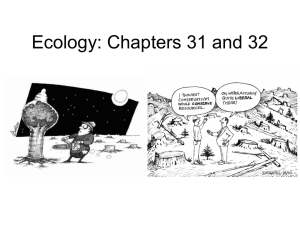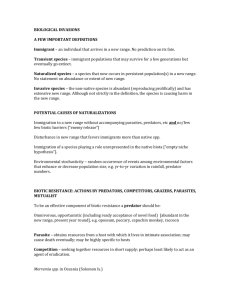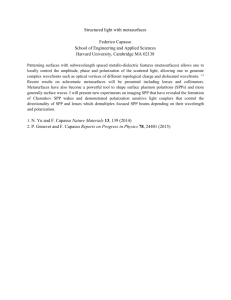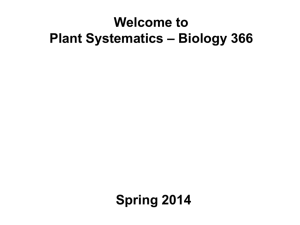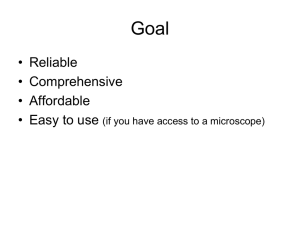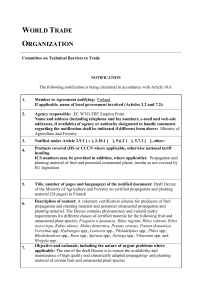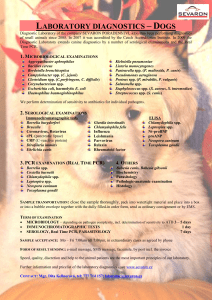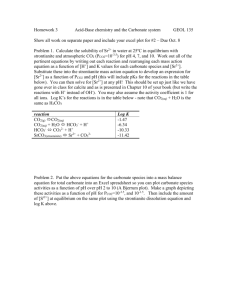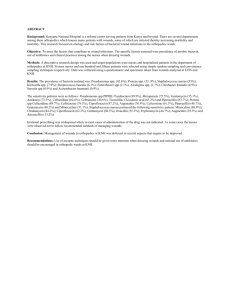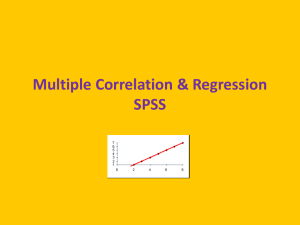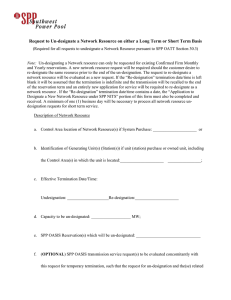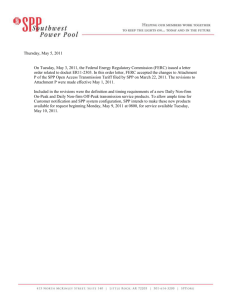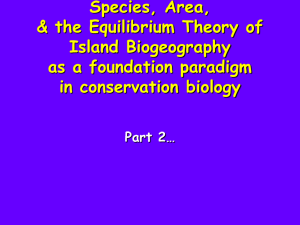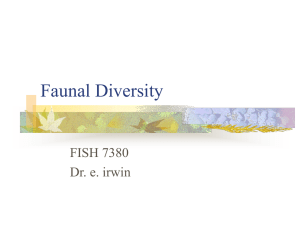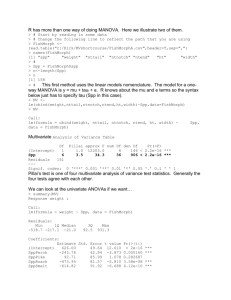British Academy/Leverhulme Project Title: The Second Person PI
advertisement
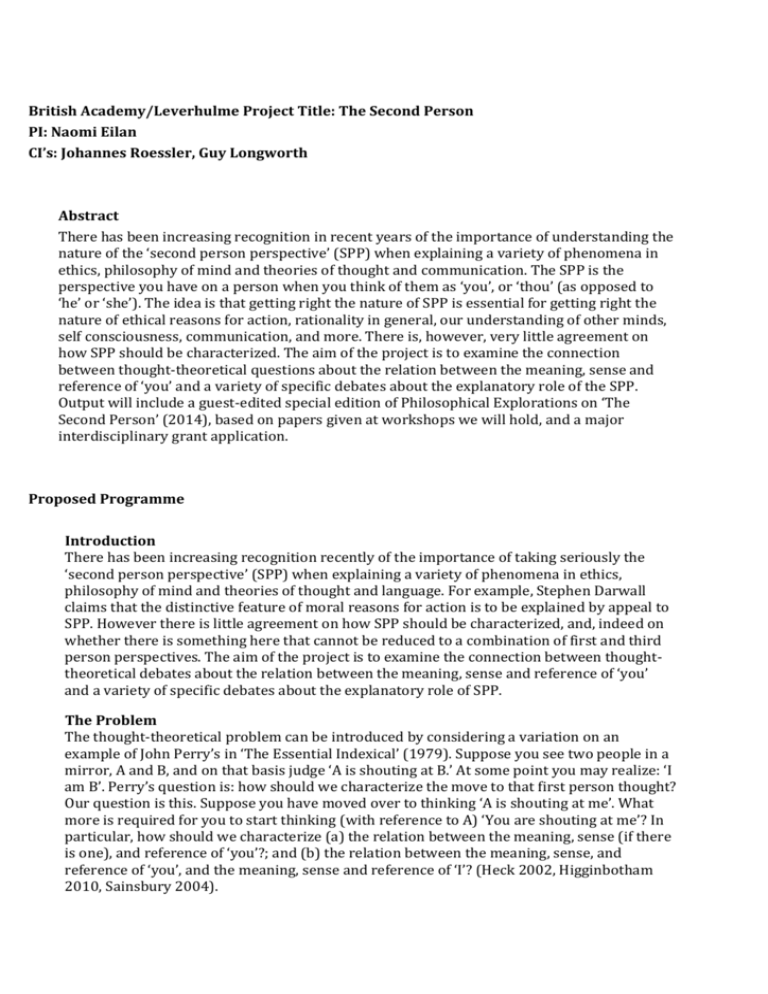
British Academy/Leverhulme Project Title: The Second Person PI: Naomi Eilan CI’s: Johannes Roessler, Guy Longworth Abstract There has been increasing recognition in recent years of the importance of understanding the nature of the ‘second person perspective’ (SPP) when explaining a variety of phenomena in ethics, philosophy of mind and theories of thought and communication. The SPP is the perspective you have on a person when you think of them as ‘you’, or ‘thou’ (as opposed to ‘he’ or ‘she’). The idea is that getting right the nature of SPP is essential for getting right the nature of ethical reasons for action, rationality in general, our understanding of other minds, self consciousness, communication, and more. There is, however, very little agreement on how SPP should be characterized. The aim of the project is to examine the connection between thought-theoretical questions about the relation between the meaning, sense and reference of ‘you’ and a variety of specific debates about the explanatory role of the SPP. Output will include a guest-edited special edition of Philosophical Explorations on ‘The Second Person’ (2014), based on papers given at workshops we will hold, and a major interdisciplinary grant application. Proposed Programme Introduction There has been increasing recognition recently of the importance of taking seriously the ‘second person perspective’ (SPP) when explaining a variety of phenomena in ethics, philosophy of mind and theories of thought and language. For example, Stephen Darwall claims that the distinctive feature of moral reasons for action is to be explained by appeal to SPP. However there is little agreement on how SPP should be characterized, and, indeed on whether there is something here that cannot be reduced to a combination of first and third person perspectives. The aim of the project is to examine the connection between thoughttheoretical debates about the relation between the meaning, sense and reference of ‘you’ and a variety of specific debates about the explanatory role of SPP. The Problem The thought-theoretical problem can be introduced by considering a variation on an example of John Perry’s in ‘The Essential Indexical’ (1979). Suppose you see two people in a mirror, A and B, and on that basis judge ‘A is shouting at B.’ At some point you may realize: ‘I am B’. Perry’s question is: how should we characterize the move to that first person thought? Our question is this. Suppose you have moved over to thinking ‘A is shouting at me’. What more is required for you to start thinking (with reference to A) ‘You are shouting at me’? In particular, how should we characterize (a) the relation between the meaning, sense (if there is one), and reference of ‘you’?; and (b) the relation between the meaning, sense, and reference of ‘you’, and the meaning, sense and reference of ‘I’? (Heck 2002, Higginbotham 2010, Sainsbury 2004). Approach Our approach to this problem will inform, and be informed by, debates about the explanatory role of the SPP in the following areas. 1. Self Consciousness: According to Merleau-Ponty, full-blown self consciousness (SC) requires the capacity to be aware of oneself as the object (accusative) of others’ ‘you’ thoughts. A weaker claim says such awareness involves a distinctive kind of SC. Are such claims defensible and, more generally, how should such awareness be accounted for? (Martin ms, Peacocke ms, Rodl 2007) 2. Other Minds: Participation in second-person interactions is sometimes said to provide for a distinctive form of epistemic contact with other minds and even to be essential for grasp of their very existence. Rochat, 2009, Reddy 2008, Thompson 2001) Can such claims be made good, and, if so, on what grounds? 3. Rational Explanation. The capacity to make sense of others’ intentional actions has traditionally been characterized either in terms of possession of a theory, or in terms of a capacity for simulation. Some recent discussions, in contrast, highlight the role of secondpersonal capacities, such as giving practical advice (Stroud 2011) or engaging in joint activities (Heal 2004). Both capacities appear to involve practical reasoning about another’s actions. Can this description illuminate the nature of rational explanation? 4. Communication: On one view, the distinctive feature of the second person stance is that it presupposes a form of reciprocity. Can appeal to such reciprocity be used to overcome problems encountered by some Gricean accounts of communication? (Bach 1987, Hornsby 1994, Searle 1969) Can an account of SPP play a role in explaining a distinction made in recent work on testimony, between telling someone something and merely asserting it in their presence? (Hinchman 2005, Moran 2005). Planned research output: 1 guest- edited journal volume Philosophical Explorations (Eilan); 3 journal articles (one per participant); one major research grant proposal.
